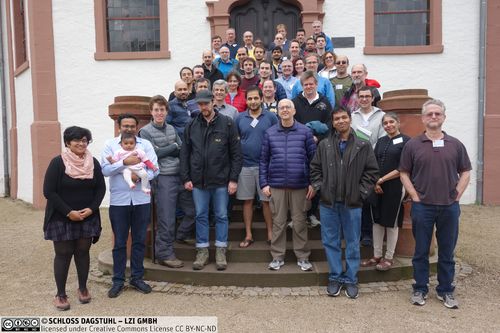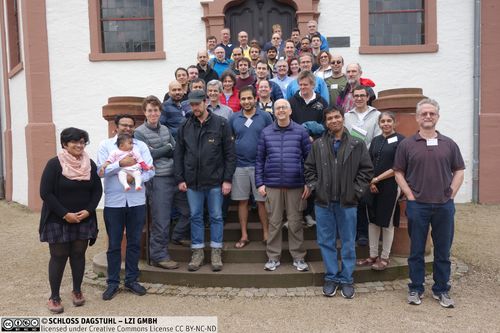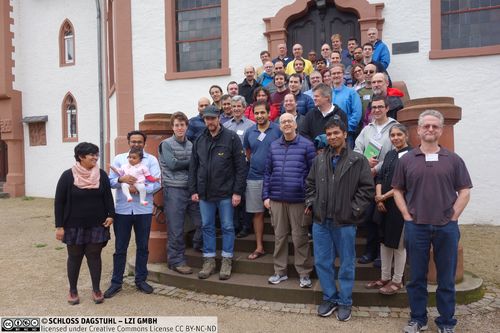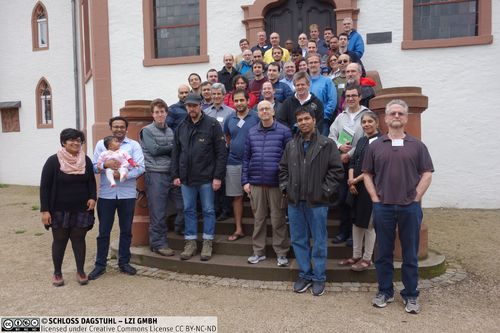Dagstuhl Seminar 17121
Computational Complexity of Discrete Problems
( Mar 19 – Mar 24, 2017 )
Permalink
Organizers
- Anna Gál (University of Texas - Austin, US)
- Michal Koucký (Charles University - Prague, CZ)
- Oded Regev (New York University, US)
- Till Tantau (Universität zu Lübeck, DE)
Contact
- Andreas Dolzmann (for scientific matters)
- Annette Beyer (for administrative matters)
Impacts
- A note on Graph Automorphism and Smart Reductions - Allender, Eric; Grochow, Joshua A.; Melkebeek, Dieter van; Moore, Cristopher; Morgan, Andrew - Rehovot : Electronic Colloquium on Computational Complexity, 2018. - 6 pp..
- Computing Hitting Set Kernels By AC0-Circuits - Bannach, Max; Tantau, Till - Cornell University : arXiv.org, 2018. - 19 pp..
- Minimum Circuit Size, Graph Isomorphism, and Related Problems : article - Allender, Eric; Grochow, Joshua A.; Melkebeek, Dieter van; Morgan, Andrew - Philadelphia : SIAM, 2018. - pp. 1339-1372 - (SIAM journal on computing ; 47. 2018, 4).
- The Choice and Agreement Problems of a Random Function - Meir, Or; Tal, Avishay - Haifa : University, 2017. - 7 pp..
- The Choice and Agreement Problems of a Random Function - Meir, Or; Tal, Avishay - Amsterdam : Elsevier, 2018 - (Information processing letters ; 133. 2018).
- The Gram-Schmidt Walk : A Cure for the Banaszczyk Blues - Bansal, Nikhil; Dadush, Daniel; Garg, Shashwat; Lovett, Shachar - Cornell University : arXiv.org, 2017. - 22 pp..
Schedule
Computational complexity studies the amount of resources (such as time, space, randomness, or communication) that are necessary to solve computational problems in various models of computation. Finding efficient algorithms for solving computational tasks is crucial for practical applications and becomes even more important with the use of computers becoming part of everyday life. Despite a long line of research, for many problems that arise in practice it is not known if they can be solved efficiently – in particular in polynomial time.
Beside questions about the existence of polynomial time algorithms for problems like Satisfiability or Factoring where the best known algorithms run in exponential time, there is a huge class of practical problems where algorithms with polynomial running time (e.g. cubic or even quadratic time) are known, but it would be important to establish whether these running times are best possible, or to what extent they can be improved.
These fundamental questions motivate developments in various areas from algorithm design to circuit complexity, communication complexity and coding theory. During this Dagstuhl Seminar, we plan to discuss some of the most exciting recent developments in those areas related to computational complexity.
We briefly mention some of the developments here: An exciting new direction in the area of Boolean circuit complexity is the connection between circuits and the design of efficient algorithms. Known circuit constructions lead to faster algorithms and faster algorithms lead to circuit lower bounds. Information-theoretic techniques have led to major progress in our understanding of communication complexity, such as new methods to compress interactive communication, and new methods to prove lower bounds on communication complexity. In the last couple of years several exciting papers made progress towards resolving classical questions in communication complexity such as the log-rank conjecture and the "clique vs independent set" problem. In recent years, a new area of coding theory developed by considering error correcting codes with local decodability properties. Recent breakthrough results show the existence of various subexponential length locally decodable codes.
The seminar plans to bring together the leading experts working on research problems closely related to these topics. Besides the regular program including talks about recent research results, we plan to organize open problem sessions, and expect ongoing research discussions throughout the week in smaller groups. This seminar is a continuation of the series of Dagstuhl Seminars entitled "Computational Complexity of Discrete Problems" and formerly "Complexity of Boolean Functions."
 Anna Gál, Michal Koucký, Oded Regev, and Till Tantau
Anna Gál, Michal Koucký, Oded Regev, and Till Tantau
Introduction and goals
Computational complexity studies the amount of resources (such as time, space, randomness, or communication) that are necessary to solve computational problems in various models of computation. Finding efficient algorithms for solving computational tasks is crucial for practical applications and becomes even more important with the use of computers becoming part of everyday life. Despite a long line of research, for many problems that arise in practice it is not known if they can be solved efficiently - in particular in polynomial time.
Beside questions about the existence of polynomial time algorithms for problems like Satisfiability or Factoring where the best known algorithms run in exponential time, there is a huge class of practical problems where algorithms with polynomial running time (e.g. cubic or even quadratic time) are known, but it would be important to establish whether these running times are best possible, or to what extent they can be improved.
These fundamental questions motivate developments in various areas from algorithm design to circuit complexity, communication complexity and coding theory. During this Dagstuhl Seminar, we discussed some of the most exciting recent developments in those areas related to computational complexity.
The seminar "Computational Complexity of Discrete Problems" has evolved out of the series of seminars entitled "Complexity of Boolean Functions," a topic that has been covered at Dagstuhl on a regular basis since the foundation of this research center. An important feature of the current research in computational complexity is the integration of ideas from different subareas of computational complexity and from other fields in computer science and mathematics. We have aimed to attract researchers from various subareas connected to core questions in boolean function complexity and foster further fruitful interactions.
 Anna Gál, Michal Koucký, Oded Regev, and Till Tantau
Anna Gál, Michal Koucký, Oded Regev, and Till Tantau
- Eric Allender (Rutgers University, US) [dblp]
- Nikhil Bansal (TU Eindhoven, NL) [dblp]
- Harry Buhrman (CWI - Amsterdam, NL) [dblp]
- Igor Carboni Oliveira (Charles University - Prague, CZ) [dblp]
- Sourav Chakraborty (CWI - Amsterdam, NL) [dblp]
- Gil Cohen (Princeton University, US) [dblp]
- Anindya De (Northwestern University - Evanston, US) [dblp]
- Pavel Dvorak (Charles University - Prague, CZ) [dblp]
- Lance Fortnow (Georgia Institute of Technology - Atlanta, US) [dblp]
- Anna Gál (University of Texas - Austin, US) [dblp]
- Alexander Golovnev (New York University, US) [dblp]
- Rohit Gurjar (Tel Aviv University, IL) [dblp]
- Kristoffer Arnsfelt Hansen (Aarhus University, DK) [dblp]
- Prahladh Harsha (TIFR - Mumbai, IN) [dblp]
- Johan Hastad (KTH Royal Institute of Technology - Stockholm, SE) [dblp]
- Pavel Hrubes (The Czech Academy of Sciences - Prague, CZ) [dblp]
- Valentine Kabanets (Simon Fraser University - Burnaby, CA) [dblp]
- Swastik Kopparty (Rutgers University - Piscataway, US) [dblp]
- Michal Koucký (Charles University - Prague, CZ) [dblp]
- Matthias Krause (Universität Mannheim, DE) [dblp]
- Bruno Loff (Charles University - Prague, CZ) [dblp]
- Shachar Lovett (University of California - San Diego, US) [dblp]
- Meena Mahajan (Institute of Mathematical Sciences - Chennai, IN) [dblp]
- Or Meir (University of Haifa, IL) [dblp]
- Shay Moran (University of California - San Diego, US) [dblp]
- Jakob Nordström (KTH Royal Institute of Technology - Stockholm, SE) [dblp]
- Ramamohan Paturi (University of California - San Diego, US) [dblp]
- Pavel Pudlák (The Czech Academy of Sciences - Prague, CZ) [dblp]
- Oded Regev (New York University, US) [dblp]
- Rüdiger Reischuk (Universität zu Lübeck, DE) [dblp]
- Michael E. Saks (Rutgers University - Piscataway, US) [dblp]
- Rahul Santhanam (University of Oxford, GB) [dblp]
- Ronen Shaltiel (University of Haifa, IL) [dblp]
- Avishay Tal (Institute for Advanced Study - Princeton, US) [dblp]
- Till Tantau (Universität zu Lübeck, DE) [dblp]
- Thomas Thierauf (Hochschule Aalen, DE) [dblp]
- Jacobo Torán (Universität Ulm, DE) [dblp]
- Dieter van Melkebeek (University of Wisconsin - Madison, US) [dblp]
- Ben Lee Volk (Tel Aviv University, IL) [dblp]
- Heribert Vollmer (Leibniz Universität Hannover, DE) [dblp]
Related Seminars
- Dagstuhl Seminar 9235: Complexity and Realization of Boolean Functions (1992-08-24 - 1992-08-28) (Details)
- Dagstuhl Seminar 9711: Complexity of Boolean Functions (1997-03-10 - 1997-03-14) (Details)
- Dagstuhl Seminar 99441: Complexity of Boolean Functions (1999-10-31 - 1999-11-05) (Details)
- Dagstuhl Seminar 02121: Complexity of Boolean Functions (2002-03-17 - 2002-03-22) (Details)
- Dagstuhl Seminar 04141: Complexity of Boolean Functions (2004-03-28 - 2004-04-02) (Details)
- Dagstuhl Seminar 06111: Complexity of Boolean Functions (2006-03-12 - 2006-03-17) (Details)
- Dagstuhl Seminar 08381: Computational Complexity of Discrete Problems (2008-09-14 - 2008-09-19) (Details)
- Dagstuhl Seminar 11121: Computational Complexity of Discrete Problems (2011-03-20 - 2011-03-25) (Details)
- Dagstuhl Seminar 14121: Computational Complexity of Discrete Problems (2014-03-16 - 2014-03-21) (Details)
- Dagstuhl Seminar 19121: Computational Complexity of Discrete Problems (2019-03-17 - 2019-03-22) (Details)
- Dagstuhl Seminar 21121: Computational Complexity of Discrete Problems (2021-03-21 - 2021-03-26) (Details)
- Dagstuhl Seminar 23111: Computational Complexity of Discrete Problems (2023-03-12 - 2023-03-17) (Details)
- Dagstuhl Seminar 25111: Computational Complexity of Discrete Problems (2025-03-09 - 2025-03-14) (Details)
- Dagstuhl Seminar 28111: Computational Complexity of Discrete Problems (2028-03-12 - 2028-03-17) (Details)
Classification
- data structures / algorithms / complexity
Keywords
- computational complexity
- discrete problems
- Turing machines
- circuits
- communication complexity
- lower bounds
- upper bounds
- coding theory
- pseudorandomness
- derandomization
- hardness of approximation





 Creative Commons BY 3.0 DE
Creative Commons BY 3.0 DE
